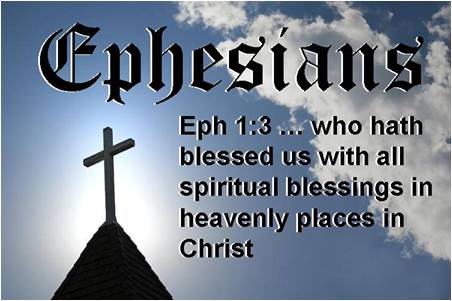 Ephesians is a “Prison Epistle,” along with Philippians, Colossians, and Philemon (see Eph 3:1, Eph 4:1, and Eph 6:20). Written by Paul from Rome, the epistle expands on themes in Colossians, much as Romans does to Galatians. Whereas Colossians develops the all-sufficiency of Christ to the Church, Ephesians shows the blessings of that “fullness” enjoyed by the members of God’s family. The idea of unity resulting from reconciliation runs strong through the book (Eph 1:9-10; Eph 2:16-18; Eph 3:4-6; Eph 4:3-6; Eph 5:30-32; Eph 6:18-20). It is possible that the epistle was actually a circular letter to the churches of Asia. Paul’s goal is to inform the saints of their privileged status and exhort them to live in a way worthy of their standing.
Ephesians is a “Prison Epistle,” along with Philippians, Colossians, and Philemon (see Eph 3:1, Eph 4:1, and Eph 6:20). Written by Paul from Rome, the epistle expands on themes in Colossians, much as Romans does to Galatians. Whereas Colossians develops the all-sufficiency of Christ to the Church, Ephesians shows the blessings of that “fullness” enjoyed by the members of God’s family. The idea of unity resulting from reconciliation runs strong through the book (Eph 1:9-10; Eph 2:16-18; Eph 3:4-6; Eph 4:3-6; Eph 5:30-32; Eph 6:18-20). It is possible that the epistle was actually a circular letter to the churches of Asia. Paul’s goal is to inform the saints of their privileged status and exhort them to live in a way worthy of their standing.
Gene Cunningham - February 2, 2003
1st Peter #5

We need to be a blessing by serving other (1Pe 2:4-10). Peter emphasizes that we continually come to Him through the Word (Jam 4:8). Jesus Christ is the living stone, elect corner stone (1Pe 2:6), chosen stone, rejected stone (Isa 42:1-2), stumbling stone. "Being built up" only as we come to Him (Mat 16:18). Peter exhorts by reminding we are elect or chosen (1Pe 2:6, 1Pe 2:9, 2Pe 1:10) — "confirm to others to assure them of our calling".
Election:
- election is all about Jesus Christ (1Pe 2:6, Isa 42:1);
- we have election only through Him; every member of the human race has the potential of being elect;
- when the word elect is used in scripture it's corporate (e.g., chosen people);
- election is unto eternal privilege; "many are called, few are chosen" what separates those is belief (Eph 1:5, Rom 8:29);
- election is by Grace through faith (Eph 2:8, 1Th 1:4-5);
- election is the perfect marraige of Sovereignty and freewill (Joh 6:37);
- election is the basis of absolute security (1Pe 1:3-5, 1Jo 5:13, Rev 13:8, Rev 17:8, Rev 21:27);
- election is is an unfathomable mystery (Rom 11:33).
Those who reject the word stumble — i.e., suffer the judgement to which they are appointed as result of their choice (1Pe 2:8). Evangelistic element in 1Pe 2:9 "that you may proclaim the praises of Him (2Pe 1:2-5)". Our priesthood allows us to "draw near" (Heb 10:19-23) in prayers and praise to God; our ambassadorship "holding fast the confession of our faith" is directed to unbelievers (2Co 5:14-21); our ministry and spiritual gift focuses on fellow believers — i.e., "consider how to stir up one another to love and good works". Beloved is a reminder we share the Love of the Father for His Son (1Pe 2:11, Eph 1:6). Peter is laying out the battle plan for the believer (2Pe 2:13).
Conference notes for this series can be found [HERE]
Scripture References: Ephesians 1:6, Isaiah 42:1-2, John 6:37, Hebrews 10:19-23, James 4:8, Ephesians 2:8, Romans 11:33, Romans 8:29, Revelation 21:27, Ephesians 1:5, Revelation 17:8, Isaiah 42:1, Revelation 13:8, Matthew 16:18, John 5:13
From Series: "1st Peter - Fellowship of Fire - Denver Colorado - 2009"
These lessons were taught at the first annual Rocky Mountain Bible Conference in Spring 2009. First and Second Peter are grouped in what are called the General Epistles written to the church at large. The theme of First Peter is the refining and growth potential in our sufferings 1Pe 1:3 1Pe 1:6; 1Pe 2:2. This epistle was written to believers scattered by persecution throughout Asia Minor (1 Pe 1:1). The date was circa 64-65A.D. the beginning of Nero?s persecutions. First Peter is the best known and loved of these epistles called by E.J. Goodspeed ?One of the most moving pieces of persecution literature.? This epistle is written to suffering believers and is styled by Isaac Walton as ?affectionate loving lowly and humble?. This epistle conveys an intense expectation of the Lord?s return as seen in 1Pe 1:51Pe 1:71Pe 1:13; 1Pe 2:12; 1Pe 4:1317; 1Pe 5:14.

